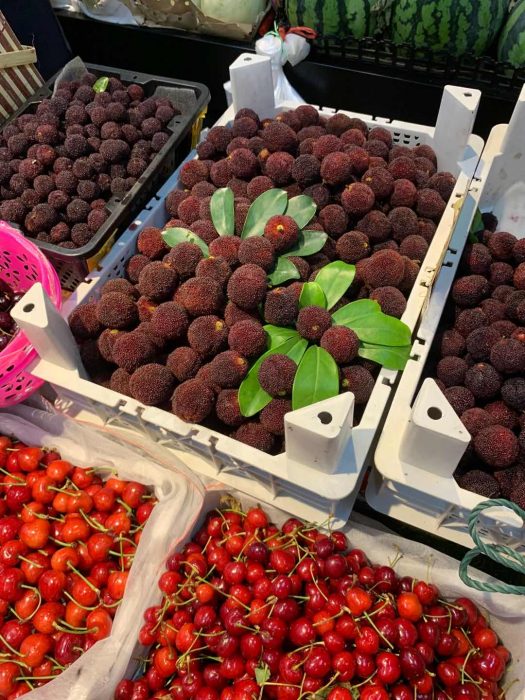What’s in a name? Shakespeare could have just as easily written, “A yángméi (杨梅) by any other name would taste as sweet.”
And this little red Asian fruit does have a plethora of monikers: Myrica rubra, Chinese bayberry, yamamomo, Japanese bayberry, red bayberry and waxberry. But a decade ago, the sweet and sour fruit was rebranded as the yumberry in the United States (where it is sold in juice and powder form, but not fresh, due to an import ban on the live fruit) to stand out from other exotic “superfoods.”
Shanghai is currently at the height of yangmei season, during which the fruits show up in every wet market and are baked, preserved, fermented, pickeld in baijiu, and popped whole into mouths across the city.
Some describe the flavor of the berry as falling somewhere between a strawberry, a cranberry and a pomegranate, with the texture of an orange and a pit like a cherry. It’s sweet but not saccharine, tart without puckering your lips. Yangmei is naturally resistant to pests, so farmers use fewer pesticides on the trees than with other fruits, so make sure you clean them well when you get them as you may have a few friends in yours.
How To Clean Yangmei
The easiest way to clean yangmei is to first wash them with water, then fill a pot with water. Add 1 tsp/5g of salt per 2 cups/500 ml of water. (You can also substitute baking soda for the salt if you prefer.) Add the yangmei and let soak for 20-30 minutes. Stirring in one direction every few minutes with chopsticks or a spoon. Drain, wash one more time with fresh water, and dry them on a paper towel. Or a towel that you don’t mind getting stained – these juices are like a beet’s, so be careful when eating!
The downside to yangmei is that they are extremely perishable that they are only available for a short period in early summer – which makes the fresh fruit all the more cherished. You’ll find yangmei juice, yangmei-infused baijiu, and dried yangmei available year-round, but for the fresh stuff, now is the time.
How to Eat Yangmei
Select berries that are deep, dark maroon bordering on purple as those are best eaten fresh. You’ll want to look them over and make sure they are blemish free. Take them home and wash them (see above), and then just pop them in your mouth. Be careful of the small pits!



3 Comments
Zulaiha
Hi. Can you please tell me whether to wash red bayberries before or after removing the skin ?
Thank you
jamie
No need to remove the skin at all! Just wash and eat 🙂
Veri
Just ate some Yang Mei and is very nice. It is not so sweet which is very good for our health as it contains less fruit sugar. It will give very little blood sugar in out blood, which is to maintain good blood sugar control to prevent diseases associated from too much sweet things in our diet.